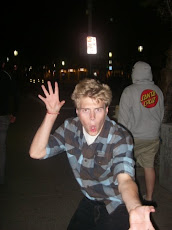Thursday, June 4, 2009
Zuleyn:
Tyler:
Wednesday, June 3, 2009
Rene:
Melchior Ndadaye, the first president ever elected in
Thaican [Intro]:
Tuesday, May 19, 2009
GROUP REACTION PAPER PROMT
Thursday, May 7, 2009
Wednesday, May 6, 2009
After all is said and done...
Steffen.......
and Austin.
"get your big mac ready."
Friday, May 1, 2009
Thursday, April 30, 2009
Diffusion of Responsibility:
Diffusion of responsibility is the idea that people are less likely to intervene to help someone who seems to need it if there are others present, because they perceive responsibility as being shared between all present, and therefore see themselves as being less responsible personally.
Bystanders effect:
The bystander effect is a social psychological phenomenon in which individuals are less likely to offer help in an emergency situation when other people are present. The probability of help is inversely proportional to the number of bystanders. In other words, the greater the number of bystanders, the less likely it is that any one of them will help.[1]
Thursday, April 23, 2009
2nd Day: Stealing my bike
Location: Downtown Santa Cruz
We did more experiments with Tyler stealing "Steffen's" bike. This time, no one attempted to stop him, although numerous people told Steffen that they saw his bike getting stolen. Some people even used excuses like, "I was using my iphone, so i couldn't do anything."
Next Class:
Bring footage to class
Consolidate all of our footage
Get footage to imovie
Synergize
Tuesday, April 7, 2009
Saturday, April 4, 2009
Experiment:Stealing my bike
Location: Boardwalk Wharf
We took several different takes of "Stealing my bike". After getting comfortable with filming and our positioning, we started to get some real results. One man actually jumped up from his seat ready to chase Tyler down after he "stole" my bike. We were swift to assure the man this was a social experiment because he was ready to beat some ass. An A+ citizen for sure. Satisfied with our progress and slightly scared of being apprehended by more outstanding citizens, we decided to call it a day.
Next time:
**Bring DvDs
**Upload footage
**Certificates
**Variations
Thursday, April 2, 2009
Tuesday, March 31, 2009
Thursday, March 26, 2009
Thursday, March 12, 2009
Thursday, March 5, 2009
Tuesday, March 3, 2009
- Set up basic rules and guidelines: Black= rules from class, Blue = rules i altered, or added Green = rules i was unsure about
- Show up to each thursday meeting & each out of class meeting prepared
- Attend all group meetings unless you have a legitimate excuse
- If unable to attend group meeting a group meeting or will be showing up late, please notify group members as soon as possible.
- A group member is allowed to miss one group meeting without penalty, if a group member misses a second group meeting they are required to bring a treat to the following group meeting for all other group members, if a group member misses a third group meeting they are eligible for expulsion from the group.
- Group members are allowed 3 strikes before they are eligible for expulsion from the group. A strike is an action by one or more group members that hurts the group significantly. Ex: Not showing up to meetings, Showing up to meetings unprepared, Not finishing assigned work, Not contributing to the group, are all examples of potential strikes.
- The legitimacy of a strike can be appealed and taken to a vote if desired. A majority of group members must decide against the strike if the strike is to be repealed.
- After 3 strikes a group member may be voted out of the group, vote should be anonymous. 5 or more members must vote the group member out in order for the member to be expelled from the group.
- Rules may be added at a later date, as long as a unanimous vote in favor of the rule is attained.
- Leader/Moderator
- Record keeper
- Agenda maker/Timekeeper
- Host??








